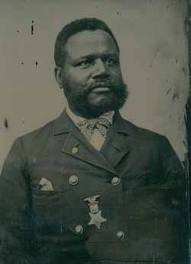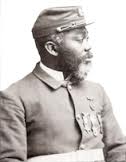 Carney, was not only a Massachusetts Patriot, but a true African-American hero and the first to be awarded the Medal of Honor. A total of over 1500 Medals of Honor were awarded during the Civil War and of that number only 25 African-Americans received that recognition. The Medal of Honor was designated by the Army in 1862 to memorialize personal acts of valor above and beyond the call of duty. Many of those 1500 Medals of Honor were awarded to military personnel that did not necessarily deserve the recognition and were rescinded by a review board in 1916. Carney’s was not rescinded and his courage and heroism remained an inspiration to his comrades and his race.
Carney, was not only a Massachusetts Patriot, but a true African-American hero and the first to be awarded the Medal of Honor. A total of over 1500 Medals of Honor were awarded during the Civil War and of that number only 25 African-Americans received that recognition. The Medal of Honor was designated by the Army in 1862 to memorialize personal acts of valor above and beyond the call of duty. Many of those 1500 Medals of Honor were awarded to military personnel that did not necessarily deserve the recognition and were rescinded by a review board in 1916. Carney’s was not rescinded and his courage and heroism remained an inspiration to his comrades and his race.
William Harvey Carney, was born in Norfolk, Virginia in 1840. His father, also named William, had escaped slavery through the Underground Railroad and eventually earned enough money to buy the freedom of his wife and son. After freeing his family, the reunited Carneys moved to New Bedford Massachusetts. The young Carney had intended to pursue the ministry, but instead, he enlisted in the Union army in 1863, following the Emancipation Proclamation. Recruited out of New Bedford, Carney joined the black 54th Massachusetts Infantry Regiment commanded by 26 year-old Colonel Robert Gould Shaw and Carney soon rose to the rank of sergeant.
After only three months of training at Readville, Massachusetts, they were shipped to the main theater of the war, South Carolina. Here, they saw action at Hilton Head, St. Simon’s Island, Darien, James Island, and at Fort Wagner. William H. Carney, in his own words, related the following story regarding the engagement at Fort Wagner,
 “We were all ready for the charge, and the regiment started to its feet, the charge being fairly commenced. We had got but a short distance when we were opened upon with musketry, shell, grape-shot and canister, which mowed down our men right and left. As the color-bearer became disabled I threw away my gun and seized the colors, making my way to the head of the column. . . In less than 20 minutes I found myself alone, struggling upon the ramparts, while the dead and wounded were all around me, lying one upon another. Here I said, ‘I cannot go into the battery alone,’ and so I halted and knelt down, holding the flag in my hand. While there, the muskets, balls and grape-shots were flying all around me, and as they struck, the sand would fly in my face.
“We were all ready for the charge, and the regiment started to its feet, the charge being fairly commenced. We had got but a short distance when we were opened upon with musketry, shell, grape-shot and canister, which mowed down our men right and left. As the color-bearer became disabled I threw away my gun and seized the colors, making my way to the head of the column. . . In less than 20 minutes I found myself alone, struggling upon the ramparts, while the dead and wounded were all around me, lying one upon another. Here I said, ‘I cannot go into the battery alone,’ and so I halted and knelt down, holding the flag in my hand. While there, the muskets, balls and grape-shots were flying all around me, and as they struck, the sand would fly in my face.
I knew my position was a critical one, and I began to watch to see if I would be left alone. Discovering that the forces had renewed their attack farther to the right, and the enemy’s attention being drawn thither, I turned and discovered a battalion of men coming towards me on the ramparts of Wagner. They proceeded until they were in front of me, and I raised my flag and started to join them, when from the light of the cannon discharged on the battery, I saw that they were my enemies. I wound the colors round the staff and made my way down the parapet in to the ditch, which was without water when I crossed it before, but now was filled with water that came up to my waist.
Out of the number that came up with me there was now no man moving erect, save myself, although they were not all dead but wounded. In rising to see if I could determine my course to the rear, the bullet I now carry in my body came whizzing like a mosquito, and I was shot. Not being prostrated by the shot, I continued my course, yet had not gone far before I was struck by a second shot.
Soon after I saw a man coming towards me, and then within halting distance I asked him who he was. He replied, I belong to the One Hundredth New York, and then inquired if I were wounded. Upon replying in the affirmative, he came to my assistance and helped me to the rear. Now then, said he, let me take the colors and carry them for you. My reply was that I would not give them to anyone else unless he belonged to the Fifty-Fourth Regiment. So we passed on , but we did not go far before I was wounded in the head.
We came at length within hailing distance of the rear guard, who caused us to halt, and upon asking who we were, and finding I was wounded, took us to the rear and through the guard. An officer came, and taking my name and regiment, put us in charge of the hospital corps, telling them to find my regiment. When we finally reached the latter the men cheered me and the flag. My reply was, Boys, the old flag never touched the ground.”
William H. Carney’s Medal of Honor citation reads,
 Rank and organization: Sergeant, Company C, 54th Massachusetts Colored Infantry. Place and date: At Fort Wagner, S.C., 18 July 1863. Entered service at: New Bedford, Mass. Birth: Norfolk, Va. Date of issue: 23 May 1900. Citation: When the color sergeant was shot down, this soldier grasped the flag, led the way to the parapet, and planted the colors thereon. When the troops fell back he brought off the flag, under a fierce fire in which he was twice severely wounded.
Rank and organization: Sergeant, Company C, 54th Massachusetts Colored Infantry. Place and date: At Fort Wagner, S.C., 18 July 1863. Entered service at: New Bedford, Mass. Birth: Norfolk, Va. Date of issue: 23 May 1900. Citation: When the color sergeant was shot down, this soldier grasped the flag, led the way to the parapet, and planted the colors thereon. When the troops fell back he brought off the flag, under a fierce fire in which he was twice severely wounded.
William Harvey Carney was the first African-American to perform an action for which a Medal of Honor was awarded, but Robert Blake was the first to actually receive the Medal in 1864.
In 1866 William Carney was appointed superintendent of streetlights for the city of New Bedford. He then went to California on business, but returned to New Bedford in 1869 and took a job as a letter carrier for the Postal Service. He worked at that job for 32 years before retiring. After retirement he was employed as a messenger at the State House, where in 1908 he was fatally injured in an elevator accident. He died in Boston and was buried in the family plot at Oak Grove Cemetery in New Bedford. Engraved on his stone monument is a gold image of the Medal of Honor. The flag at the Massachusetts state house was flown at half mast in his remembrance, an honor usually given only to honor a deceased governor, senator, congressman or U.S. President. Carney’s brave deed is depicted on the Saint-Gaudens Monument in Boston Common. The rescued flag from Fort Wagner is enshrined in Memorial Hall, Boston.
William H. Carney was not only a Massachusetts Patriot and African-American Hero, but an inspiration to all Americans that answer the call to protect and serve their country.
Bummer


Great story. Thank you, Bummer.
Sandy,
Thanks so much. Happy Easter to you and family!
Bummer